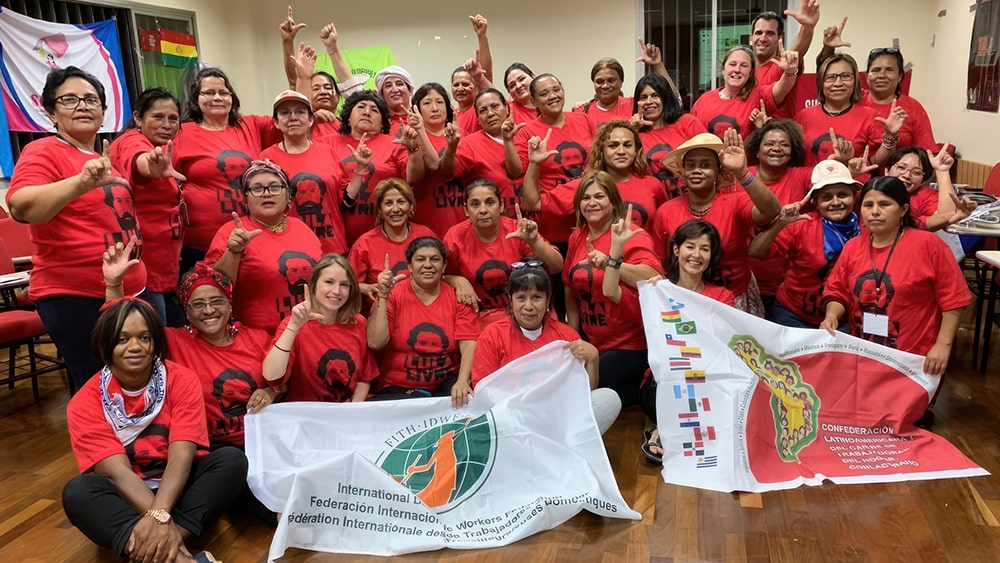The International Labour Conference this June will hold a General Discussion on a “just transition,” a topic introduced by the labor sector to center labor rights when addressing environmental change and its impacts on the economy and the world. The move to greener ways of producing and living must be accompanied by our core decent work demands.
The IDWF firmly believes that environmental justice is a labor issue, and that domestic workers are part of the Just Transition. Specifically, climate change does not only affect biodiversity loss, deforestation, and land use, but also entire labor sectors, acting as an exacerbator of existing precarities and endangering domestic workers by exposing them to health risks. Many domestic workers used to work the land as farmers and suffered the impacts of the contamination of our lands, rivers, and the weakened ecosystem, unable to reduce virus emergence. On one hand, domestic workers are disproportionately affected: they come from agrarian backgrounds, live in crowded unsanitary conditions, and do not have access to social protection. On the other hand, they are the agents of the transition, as they handle waste within households and do food rationing in times of shortage, among other ways in which they fight in their daily tasks.
A just transition presents opportunities to achieve the four pillars of the Decent Work Agenda (social dialogue, social protection, rights at work and employment), which are indispensable building blocks of sustainable development. Just transition means greening the economy in a way that is fair and inclusive of everyone concerned, creating decent work opportunities, and leaving no one behind. Our movement refuses to be left behind, and domestic workers are front and center of Just Transition.
Therefore, the International Domestic Workers Federation (IDWF) urges all policymakers and stakeholders to:
Recognize domestic workers’ contributions and enforce their rights
A just transition approach must recognize the immense contribution of domestic workers and grant them coherent and comprehensive policies that respect, promote and comply with Convention 189 and its fundamental principles, fostering the creation of more decent jobs for domestic workers.
There is no “one size fits all” solution. Policies and programs must be designed in line with the specific conditions of every economic sector. As the economy transitions to a more sustainable model, it is important to ensure that domestic workers are paid fair wages, have access to social protection and decent working conditions.
Promote social dialogue and tripartism: Nothing for us without us!
Social dialogue with all partners involved is essential for a just transition. Domestic workers’ participation and representation -through collective bargaining, for example- will ensure improved pay and working conditions and provide essential support in the development of policies for reskilling and redeployment. This social dialogue needs to be gender inclusive and integrate all people in society, to bring about social, economic, and environmental sustainability with decent work and social inclusion for domestic workers.
Include social protection programs for DWs in new policy frameworks
The COVID-19 crisis underscored domestic workers’ lack of access to social protection, exacerbating poverty and inequalities. So, in the climate crisis, it’s key to identify and understand new challenges, and formulate adequate and innovative social protection measures that protect existing benefits and take into account emerging social needs. Domestic workers must be provided with targeted social protection measures such as unemployment insurance, health care, retirement benefits, and access to basic services (energy, transportation, housing, etc.). Plus, efficient care services and gender-transformative social protection make it possible for more domestic workers to participate in the formal economy and to engage in decent work, as they help promote employment and increase women’s bargaining power. Furthermore, governments must ensure the portability of social protection entitlements in situations of cross-border displacement, including those due to the transition to environmentally sustainable economies and climate change impacts.
Implement adequate OSH standards
Governments, in consultation with trade unions and social partners, must map increased or new Operational Safety and Health (OSH) risks for our sector resulting from climate change, and implement adequate prevention/protection measures and standards. Inspections to monitor compliance are vital. Governments must regulate and encourage companies to reduce, minimize, and, where possible, eliminate hazardous chemical products that domestic workers often use to perform their job. They should also address the OSH impacts of informality and promote formalization through training, capacity building and certification, in addition to legislation.
Foster gender equality and consider women as key agents of change
According to ILO (2022), “there is growing scientific consensus that climate change has gendered effects and exacerbates pre-existing gender-inequalities in the world of work”. Thus, specific gender policies and programs should be adopted to promote equitable outcomes. A just transition and the promotion of gender-equality are intrinsically linked and mutually reinforcing. Just transition is critical to achieving gender-transformative climate action and social justice.
Climate policies should include targeted measures to support women experiencing intersectional forms of discrimination, like domestic workers, to ensure that climate action leaves no one behind and achieves a just transition for all. This would not only minimize social, economic, and environmental risks and support greater inclusion, but also strengthen climate mitigation and adaptation efforts through the empowerment of women domestic workers as key agents of change.
Invest in the care sector
Investing in the care sector is essential for ensuring more resilient economies and societies in a changing climate. Sectors with most women workers, such as the care sector, continue to have poor wages, are precarious and often informal, and also face worse working conditions than sectors dominated by men. Just transition policies must consider the key role of the domestic workers in the care sector. In fact, the demand for care and health services intensifies due to climate change and disasters and will lead to an increase of the time women spend on unpaid care and exacerbate resource poverty. This may also increase the demand for care services, often provided by domestic workers.
Statement in:






